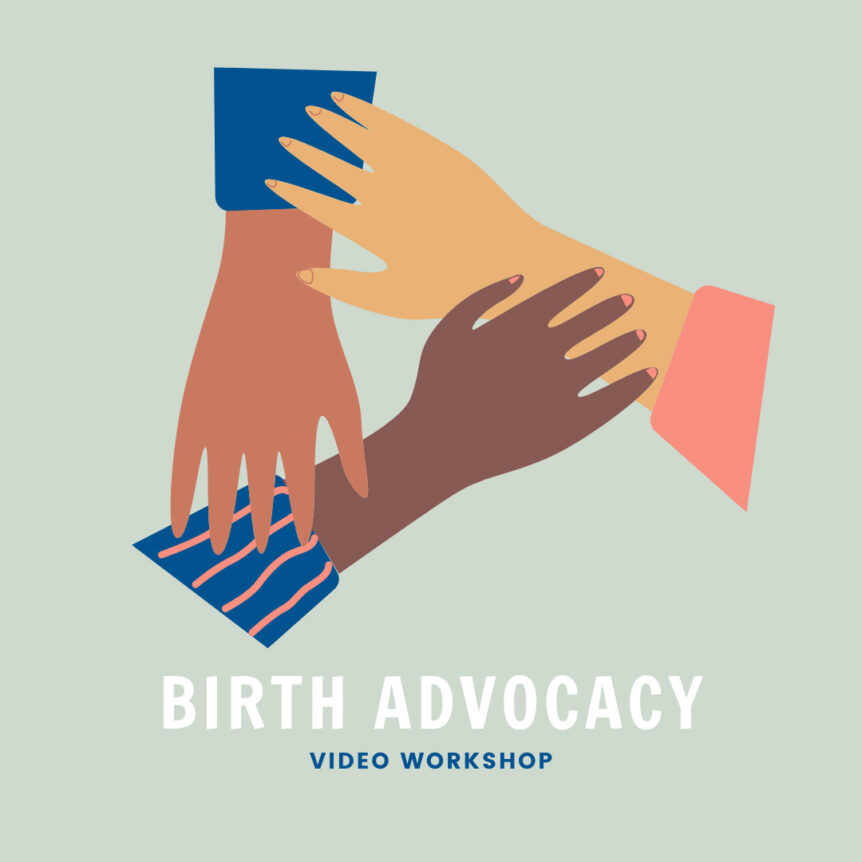When we think about advocacy, examples of movements for social change may come to mind before thoughts of how the need for advocacy shows up in our everyday lives, especially if we belong to the dominant culture and generally have less to advocate for. As a cisgendered, white-settler female in a heterosexual partnership living in colonial-Canada, I was privileged to avoid thinking a lot about personal advocacy until I became pregnant with my first baby and began considering how I, or someone on my behalf, may need to advocate for my rights in birth.
Growing up, I was fascinated with babies and birth and asked an abundance of questions to elders in my circle who had birthed before. They told me many stories of their birth experiences, the beautiful moments of holding their baby for the first time and watching them suckle satisfyingly at the breast. They also shared less pleasant parts that they brushed off as normal, standard birth procedures, inevitable really, but that made me feel uncomfortable and frightened of what was ahead of me should I have babies myself. I heard of how they lay flat on their back on a hospital bed all alone except for the doctors and nurses, separated from their male partners who were restricted to sitting out in the waiting room. I learned of episiotomies and weird pain treatments that left you woozy, of forced formula feeds and glass-windowed nurseries lined with neat rows of burrito babies, down the hall from new parents until the appropriate time to breastfeed, as deemed by a strict hospital-assigned schedule. “You don’t want to get in the habit of spoiling babies from the get go,” I was told, sometimes seriously by people who firmly believed it and other times mockingly by those who found the advice appalling.
I remember my late grandmother telling me with a sly smile how she defiantly nursed her babies, on demand no less, despite pressure from the doctors, neighbours and even well-meaning family members to feed formula, which many at the time believed was healthier than breastmilk. “I didn’t even cover
up,” she told me, almost boastful.
“Even in church. Some people were horrified, but using a blanket could get so warm and stuffy and I thought it must be terribly uncomfortable for the baby so I didn’t bother,” she explained with a chuckle.
I learned quickly that for every story of birth trauma there’s a story of birth resistance and with a burning desire to birth in a way that honoured myself, my baby, my ancestors and my future descendants, I committed to seeking out the stories of advocacy that empowered. Over the following months, my belly grew and my mind wondered about what possible scenarios would occur when it came time for me to
birth. Dedicated to advocating for the birth that we knew was right for me, my partner and our child, together we committed to learning about birth practices, potential interventions and the role active advocacy plays into it all.
The Evolution of Partner Support in Birth
Having a person or people specifically assigned the responsibility of providing emotional and physical
support to their birthing person is as ancient a practice as birth itself. Before birth was medicialized and
directed to take place in hospitals, the process occurred in the home. A birthing person’s friends and family, both elders and peers and usually female identifying, would join with a midwife in supporting the birth. The midwife would tend to the physiological birth while others cared for the person in labour, routinely invoking ceremonial or spiritual strategies to help move them through the contractions and
into parenthood, supported holistically by the community. When birth was moved into hospitals in the twentieth century, familial support was involved less and medical staff and tools more.
Birthing people lost autonomy over their bodies and births as medical interventions, such as episiotomies and epidurals, became more commonplace.
Between the 1960s and 1980s, under pressure from birthing folks tired of going it alone, male partners started to be allowed in the birthing room to witness and support. Modern birth partnership gained popularity and advocacy within the birthing room took root. Books and courses designed to encourage dad involvement emerged en masse and many male-identifying partners eagerly accepted this invitation, taking their newfound support role seriously.
Doula-Who?
Undoubtedly, continuous companionship throughout labour improves birth outcomes for the birthing person (Bohren et al., 2019). Though bio dads are increasingly offering this support, many expecting parents, especially those embarking on this journey for the first time, long for a calm and nurturing presence on their birth team to guide them along confidently. In 2010, when I was pregnant with my
first baby and expressed these desires, several friends offered the same birth advice: “Get a doula.”
“A what?” I asked, confused when I heard the word for the first time.
“A doula,” she explained. “It’s a type of birth partner, but in more of a doting big sister kind of way. They make sure you’re taken care of so everyone else can focus on other things.”
Indeed, the term doula is Greek in origin and refers to a “woman’s servant.” The goal of a doula is to attend entirely to their client holistically, holding space for them to be however they need to be during birth, anticipating their needs before they arise. Considered to be trained, non-medical professionals, doulas often work privately, independently or in teams, and may or may not include client advocacy as
a service that they provide. If you are considering welcoming a doula onto your birth team, make sure you understand their scope of practice and how comfortable they are advocating for you to different types of health professionals in various situations.
Of course, that is not to say that a professional doula is the only option. Because doula services are currently not covered under provincial health funding (though some individual health insurance plans include it either explicitly or as part of a flexible spending account), a certain degree of affluence is typically required to access professional doulas and it sadly remains a largely inaccessible, while invaluable, support. But if a doula doesn’t fit in your budget, don’t despair! A close friend or sister can be a fully effective partner and advocate in birth, as long as they are aware of and confident in their role. Many professional doulas also offer bursaries, sliding scales, energy exchanges or other flexible compensation programs depending on individual circumstances. Know that you have the right to continuous support in birth and seek a partner that aligns with you in the most important ways.
Birth Partner vs. Birth Advocate
Whether dad, doula, mother-in-law or cousin, birthing individuals are entitled to be supported by a com-
panion of their choice during labour and birth, even during the COVID-19 pandemic, according to the World Health Organization (2020). Not only is a birth partner necessary to provide emotional and physical comfort during birth, a birth advocate is equally as vital to have beside you. The difference
may seem subtle but it is important to notice how both roles matter in birth.
While a birth partner is primarily there to provide the birthing person comfort through their presence, a birth advocate is a voice for the birthing individual when they are unable to speak for themselves. A birth partner can also be an advocate, though some partners prefer not to advocate, perhaps because they are uncomfortable with the role or it is outside of their scope of practice. The roles can be assumed by different people, where one takes on primary responsibility of tending to the birthing person, while
another ensures that the birthing person’s desires are vocally expressed and adhered to.
Ideally, both roles require some preplanning and preparation. The birthing person may have specific preferences for birth or alternately, specific things to be avoided. Discussing possible scenarios and how to handle them if they arise can help ease anxieties and concerns. Birth partners and advocates alike should be aware of the normal birth process, and when their support will be needed more intensely. Birth partners will want to know how to do a proper hip squeeze and apply it in rhythm with the incoming waves of contractions. Birth advocates will want to know that during transition and pushing stages especially, a birthing person must go deep within themselves to do their work and they must be
able to trust that their advocate’s voice will effectively replace their own if conversations with the medical team are needed.
If you are entrusted with one of these roles, do your homework and strengthen your relationship with
your expectant close one. The tighter we feel held, the more we can let go, which is exactly what we need to do to move through birth.
Beyond Birth Advocacy
While every birthing person deserves an advocating voice, it is important to recognize that individuals who belong to certain identity groups are in even more need of advocacy to ensure respectful, appropriate treatment during birth. In Canada, Indigenous people giving birth are more likely to experience negative birth outcomes, such as preterm birth and infant mortality, than non-Indigenous Canadians. Contributing factors are numerous but many, if not all, can be linked back to colonialism’s impact on the First Nations of this land (Smylie et al., 2010).
Birthing people labelled ‘obese’ also face stigmatization by health professionals, which can lead to problematic consequences such as early medical intervention due to the automatic and biased assumption that obese bodies are innately “risky” (Bombak et al., 2016). Folks who identify as disabled also report having less positive birth experiences than non-disabled people, stating that they don’t feel listened to or supported and are left out of decision-making processes that directly relate to their birth (Malouf et al., 2017).
For people who identify as belonging to one or more of those groups, the need for birth advocacy may be even greater than for the less marginalized birthing person.
Microaggressions, macroaggressions, unfair treatment and resulting disparities are very real and impact birthing people deeply. To work towards equity in birth, people can donate toward culturally-relevant doula bursary funds; learn about the discrepancies in care and actively address them when observed; and engage in advocacy work, such as letter writing, to encourage changes in policy, funding and training.
No matter the circumstance, a birthing person should never have to be alone if they don’t want to be. Birth is a vulnerable process and those embarking on the journey should be confident that their partner(s) know how to support them in the best ways throughout all stages of labour and birth. By talking about roles and strategies beforehand with everyone who plans to be involved in the birth, the birthing person can know that although unexpected situations may arise and plans may have to change, there is someone right beside them who has their back, voice and heart. While birth partnership and
advocacy have different flavours, the roles complement one another and together can help cultivate a physical and emotional space where birthing people can thrive.
References
Bohren, M.A., Berger, B.O., Munthe-Kaas, H., Tunçalp, Ö. (2019). Perceptions and experiences of labour companionship: A qualitative evidence synthesis. Cochrane Database of Systematic Reviews, 3.
Bombak, A. E., McPhail, D., & Ward, P. (2016). Reproducing stigma: Interpreting “overweight” and “obese” women’s experiences of weight-based discrimination in reproductive healthcare. Social Science & Medicine, 166, 94-101
Malouf, R., Henderson, J., & Redshaw, M.A. (2017). Access and quality of maternity care
for disabled women during pregnancy, birth and the postnatal period in England: Data from a
national survey. BMJ Open, 7.
Smylie, J., Crengle, S., Freemantle, J., & Taualii, M. (2010). Indigenous birth outcomes in Australia, Canada, New Zealand and the United States – an overview. The Open Women’s Health Journal, 4(2), 7-17.
World Health Organization (WHO). (September 2020). Every woman’s right to a companion of choice during childbirth. Departmental News. https://www.who.int/news/item/09-09-2020-every-woman-s-right-to-a-companion-of-choice-during-childbirth


